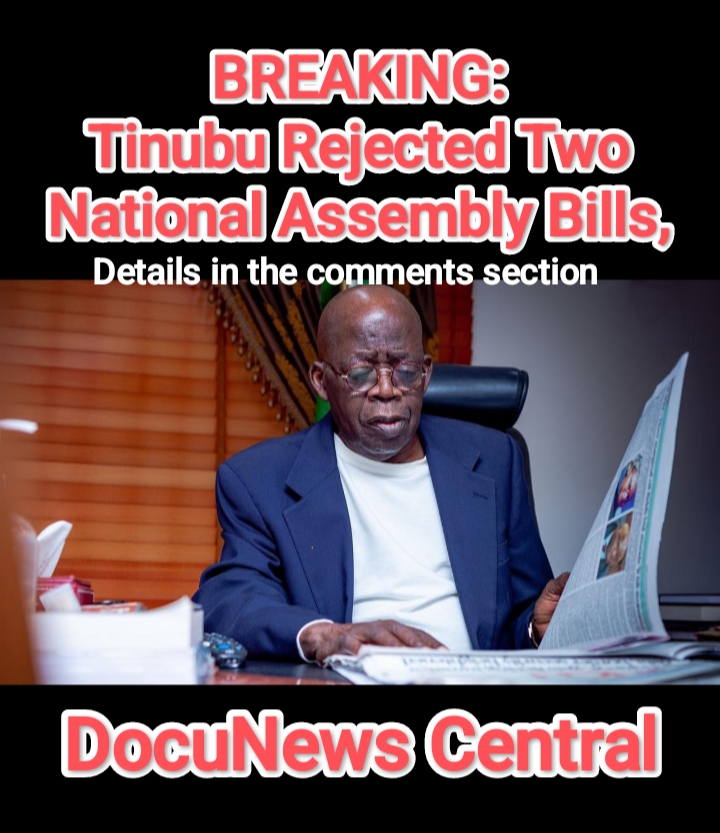
By DocuNews Central Staff Writer
President Tinubu Declines Assent: What Happened
In a major political development, President Bola Ahmed Tinubu has declined to sign into law two significant bills passed by the National Assembly. The President communicated his decision to the Senate through official letters, which were read aloud by Senate President Godswill Akpabio during Tuesday’s plenary session, October 7, 2025.
This move has immediately triggered nationwide discussion. Legal experts, political commentators, and civil society organizations are dissecting the implications of Tinubu’s decision. Under Nigeria’s Constitution, a bill passed by both legislative chambers requires presidential assent to become law. When the President withholds assent, he must provide clear reasons in writing. Tinubu did exactly that.
The two bills affected are:
- Nigerian Institute of Transport Technology (Establishment) Bill, 2025
- National Assembly Library Trust Fund (Establishment / Amendment) Bill, 2025
In separate letters addressed to Senate President Akpabio, Tinubu detailed his reasons for rejecting both bills. According to a report by Premium Times, the President described the bills as “tainted with fundamental defects.”
Tinubu’s Reasons for Refusing to Sign
1. Fundamental Defects and Legal Conflicts
President Tinubu pointed out that both bills contained what he termed fundamental legal and constitutional defects. He stated that several sections conflicted with existing financial regulations and constitutional provisions governing public institutions.
Tinubu invoked Section 58(4) of the 1999 Constitution (as amended), which authorizes him to return any bill to the National Assembly along with his observations and objections. This, he said, is in line with the constitutional responsibility of the executive arm to uphold fiscal prudence and legal consistency. (Vanguard)
2. Duplicate Revenue Sources and Fiscal Burdens
The President’s main concern with the Nigerian Institute of Transport Technology Bill was its proposed funding structure. Section 18(4a) of the bill proposed that the institute be financed through 1% of all import and export freight levies. According to Tinubu, this levy was not approved by the Federal Executive Council (FEC) and duplicates existing revenue streams already supporting the transport sector.
He argued that adding another levy would impose unnecessary fiscal burdens and lead to confusion in fund allocation. Tinubu emphasized that public institutions must not operate outside the national budgetary system, warning that unapproved revenue channels could undermine fiscal discipline. (Vanguard)
3. Borrowing Powers Without Oversight
Another key point of objection lies in Section 21(2) of the transport institute bill. The clause grants the institute authority to borrow or secure overdrafts up to ₦50 million without seeking approval from the President or the Minister of Finance.
Tinubu criticized this provision as financially dangerous. He argued that such autonomy could create loopholes for abuse and mismanagement. According to him, no government-funded institution should be allowed to borrow independently without federal oversight. He stressed that fiscal discipline and transparency must guide all borrowing activities, especially given Nigeria’s fragile economic situation. (Vanguard)
4. Contradictory Clauses on Fund Management
The President also raised concerns over Sections 23 and 24(5) of the bill, which empower the institute to invest and manage “surplus funds.” Tinubu described these clauses as inconsistent and contradictory. He explained that agencies funded through federal budgets rarely generate “surplus funds” that could be invested independently.
According to him, such clauses would allow the agency to operate like a private enterprise, which contradicts public finance laws. He also noted that Section 18(2) of the same bill contradicts the intended financial discipline of the organization.
Tinubu’s objection aligns with best practices in public sector management, where transparency and accountability are non-negotiable principles. (Premium Times)
5. Unsustainable Provisions in the Library Trust Fund Bill
For the National Assembly Library Trust Fund Bill, Tinubu expressed similar concerns. He argued that the bill contains ambiguous and conflicting provisions regarding taxation, remuneration, tenure, and funding structures. He said the bill’s financial framework contradicts Nigeria’s fiscal responsibility laws and could create duplication of functions within existing agencies.
Tinubu warned that approving such a bill could set a dangerous precedent. According to him, it could encourage other public agencies to demand similar financial autonomy, leading to chaos in the management of national funds. He also pointed out that the proposed tenure and salary structures violate existing public service rules. (Daily Trust)
Senate’s Response to Tinubu’s Decision
After reading Tinubu’s letters, Senate President Godswill Akpabio commended the President for his thorough review and legal clarity. He emphasized that the Senate values the President’s concerns and will re-examine both bills to address the raised issues. (AllAfrica)
Akpabio described Tinubu’s approach as “meticulous and responsible,” assuring Nigerians that the legislature will collaborate with the executive to ensure all laws align with constitutional principles. The Senate has since referred the bills to relevant committees for amendment and harmonization.
Other Bills Signed by Tinubu
Interestingly, while refusing to sign these two controversial bills, Tinubu approved two others on the same day:
- Nigeria Police Force Training Institute (Establishment) Bill
- Nigeria Police Trust Fund (Establishment) Bill
This move reinforces that Tinubu’s refusal was not politically motivated but based on legal and financial substance. It highlights his commitment to ensuring all laws meet constitutional and fiscal standards before becoming binding.
Public Reaction Across Nigeria
Legal Analysts and Economists Weigh In
Legal experts have described Tinubu’s decision as a constitutional safeguard. According to Dr. Chidi Onwuegbuchi, a constitutional lawyer, the President acted within his powers by rejecting bills that could jeopardize financial accountability.
Economists, on the other hand, applauded the move as a signal of fiscal discipline. They argue that unchecked borrowing and revenue duplication have long plagued Nigeria’s economy, and Tinubu’s position may strengthen public finance management.
Mixed Reactions from Civil Society
However, not everyone agrees. Some civil society organizations believe the refusal delays much-needed institutional reforms. Others see it as an opportunity for lawmakers to improve the quality of legislation and enhance transparency.
Groups like the Centre for Legislative Studies urged the National Assembly to embrace the feedback positively. They stated that the executive’s scrutiny enhances the integrity of Nigeria’s democracy.
Political Implications and Broader Context
Separation of Powers at Work
This episode underscores the balance of power between the executive and legislative arms. The President’s veto does not mean hostility but a necessary check within a functioning democracy. If the National Assembly insists, it can override the veto with a two-thirds majority, though that remains unlikely given the Senate’s cordial relationship with the President. read also Top 10 Herbal Remedies in Nigeria | DocuNews Central
Tinubu’s Reputation for Fiscal Discipline
Observers note that Tinubu’s record as Lagos State governor showed strong adherence to fiscal responsibility. His decision reflects consistency with his long-standing governance philosophy—prioritizing transparency and accountability in financial management.
By refusing to sign flawed bills, Tinubu reinforces his administration’s promise to uphold economic reform and eliminate duplication in public spending.
Reactions from Major News Outlets
Several reputable Nigerian media outlets have reported on this issue:
- Premium Times confirmed that Tinubu cited “fundamental defects” as his main reason for rejecting the bills.
- Vanguard detailed his objections regarding unapproved levies, borrowing powers, and fund management.
- Daily Trust highlighted contradictions in the Library Trust Fund Bill.
- AllAfrica reported that Akpabio has referred the bills back to committees for further work.
- Legit.ng summarized the event as another example of Tinubu’s fiscal caution and legislative scrutiny.
Together, these outlets provide a consistent picture: Tinubu’s refusal was deliberate, justified, and constitutionally grounded.
Conclusion
President Tinubu’s refusal to sign the Nigerian Institute of Transport Technology Bill and the Library Trust Fund Bill marks another chapter in Nigeria’s evolving democracy. It reminds lawmakers of the need for clarity, precision, and fiscal responsibility when drafting laws. read also Victory for Motorists as Appeal Court Bars VIO From Impounding Cars
The Senate’s willingness to review and correct the identified flaws signals healthy institutional collaboration rather than confrontation. Nigerians, meanwhile, watch closely as both arms of government seek common ground. http://legit.com
The ultimate outcome will reveal whether legislative drafting can meet the high standards demanded by a President determined to uphold the rule of law and financial discipline.
DocuNews Central will continue to monitor this story as it unfolds. Updates will be provided as soon as the Senate’s revised versions of the bills are presented. Stay tuned for further developments on this crucial national issue.
Copyright © 2025 DocuNews Central. All Rights Reserved.







